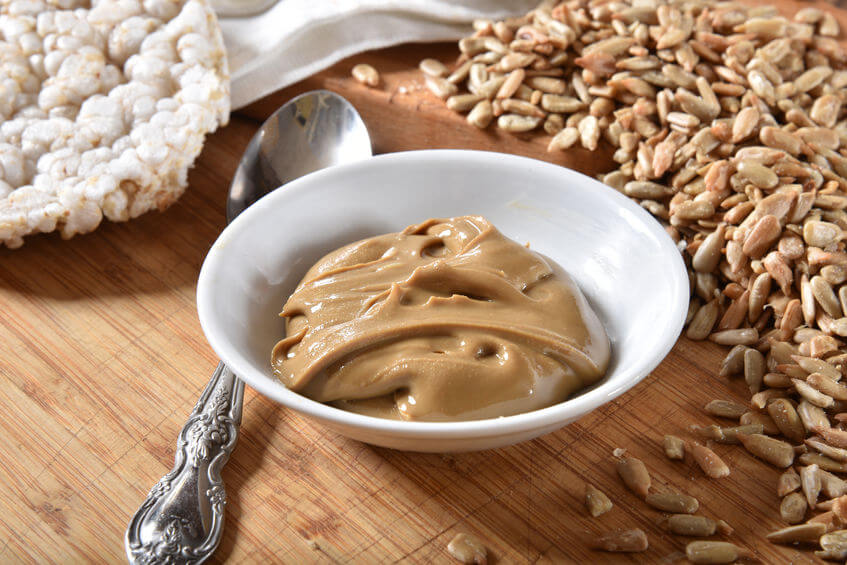In the debate over sunflower butter VS peanut butter, the average person might not be tempted to branch out if they’re perfectly happy with their Skippy or Jif. It’s no surprise, considering that it wasn’t that long ago that peanut butter was the only game in town (commercially speaking).
While different types of nut butters have probably been around a lot longer than you think – the process of grinding nuts can be definitively traced back to as early as 1500 BC in Peru – peanut butter as we know it today was “invented” by cereal magnate Dr. John Harvey Kellogg in 1895.
Although it was introduced to the public at the St. Louis World’s Fair in 1904, the popularity of peanut butter likely came from its inclusion in army rations in WWI and WWII.
Peanut Butter Alternatives
Today, you can visit your local market and find options for a wide range of nut butters, including almond, cashew, hazelnut, and pistachio, as well as seed butters like sunflower butter, just for example.
This could be due, in part, to the prevalence of peanut allergies, or it may be related to the growing number of specialized diets (vegetarian, vegan, keto, etc.) calling for varied protein sources, including vegetable proteins.
Before you stray from your tried-and-true PB&J recipe, however, you probably want to know a bit more about what you can expect and the potential benefits of making a switch.
When it comes to sunflower butter VS peanut butter, you might be surprised to learn that they are nutritionally similar. However, there are some key differences that could influence which one you lean toward. Here’s what you should know before choosing one butter over the other.
Sunflower Butter

The first thing you need to know is that sunflower seeds are not nuts, although sunflower butter is often grouped with nut butters.
If you happen to be allergic to tree nuts, there’s a good chance you can still consume sunflower butter without worrying about allergic reaction – unless you also happen to be allergic to sunflower seeds, which is a fairly rare allergy.
Ingredients
Sunflower butter products may feature additives like oil, sugar, and salt to achieve a certain taste and texture, as well as to keep the product from separating.
You could cut down on some nutritional numbers (such as sodium, carbs, and sugar) by purchasing natural products with no additives or making your own nut butters at home.
As a side note, mixing natural nut butters and refrigerating them after opening is a great way to stop them from separating and maintain the classic, creamy texture.
So, how do sunflower seeds stack up in the sunflower butter vs peanut butter showdown? Is this alternative nutritionally preferable to peanut-based products?
Peanut Butter

Like sunflower butter, peanut butter is technically not a nut butter. This may surprise you because of the word “nut” in the name, but peanuts are actually a legume.
This, however, does not preclude peanuts from causing allergies.
Among the most common food allergens, peanuts are on the “Big 8” list that includes shellfish, milk, tree nuts (like almonds, pistachios, walnuts, and more), soy, wheat, and so on.
This is likely one of the reasons why more and more people are seeking alternatives to peanut butter.
Sunflower Butter VS Peanut Butter
Let’s have a closer look at how the two stack up.
Nutrition
The table below compares the nutrition facts of sunflower butter VS Skippy peanut butter:
| Product | Sunflower Butter | Peanut Butter |
| Serving Size | 2 Tablespoons | 2 Tablespoons |
| Calories | 198 | 190 |
| Fat | 8.8g | 16g |
| Sodium | 106mg | 150mg |
| Carbohydrates | 7.4g | 6g |
| Fiber | 1.8g | 2g |
| Sugar | 3.4g | 3g |
| Protein | 5.6g | 7g |
As you can see, peanut butter is more or less in line with the nutritional stats for sunflower butter, although there is significantly more fat and sodium in peanut butter, as well as slightly more protein.
Again, some nutritional numbers can be curbed by opting for natural peanut butter products that don’t contain unwanted additives like sugar and hydrogenated vegetable oils.
If you happen to have a peanut allergy, sunflower seeds are the clear winner in the sunflower butter VS peanut butter debate. However, if you don’t suffer from this common allergy, one nut butter may appear to be more or less as good as the other, nutritionally speaking. This brings us to other considerations, like taste and versatility.
Taste
There’s no denying that sunflower seeds and peanuts taste nothing alike, and all things being equal, this fact alone could end the debate between sunflower butter vs peanut butter for people who were raised on the latter.
If you’re expecting a flavor equivalency, you’re out of luck.
Peanut Butter Taste
Peanut butter tastes a lot like peanuts, as you might expect. It has the nutty flavor you know and love, often paired with sweet and salty notes, largely due to additives.
If you try natural peanut butters that only contain ground peanuts, you’ll still get the strong peanut flavor, but without the sweet and salty flavors brands like Skippy and Jif have taught us to expect.
Sunflower Butter Taste
Sunflower butter, on the other hand, has a somewhat more complex flavor profile.
It does taste a bit like raw sunflower seeds, but it has earthy, toasty undertones, likely from the roasting process required before seeds are ground into creamy butter.
Dry roasted peanuts are also used for natural peanut butter, but this only seems to bring out a more pronounced peanut flavor.
Like nut butters, sunflower butter can absolutely be substituted for peanut butter on sandwiches and in recipes, delivering ostensibly the same consistency. However, it tastes different, and this will be noticeable to anyone expecting distinctively peanuty flavors.
Preparation
You might be astonished to learn just how easy it is to make nut butters, provided you have a good food processor in the home.
To start, all you really need is some roasted peanuts or sunflower seeds.
Can you roast your own? Absolutely, although shelling and roasting can significantly increase the time suck of this process. If you can find shelled and roasted products, you can literally cut your prep time from hours to minutes.
Homemade Sunflower Butter
If you want to roast raw sunflower seeds, you can do so in a 350-degree oven until they start to brown and release a fragrant, toasted scent. This generally takes only about 10-15 minutes, so keep a close eye on seeds to prevent burning.
Once the seeds are roasted, simply transfer them to your food processor and begin breaking them down.
After roughly five minutes, you’ll have a fine powder, which will start to turn into a sticky lump in about another three minutes.
Two to three minutes of processing should produce the creamy sunflower butter you’re used to.
Homemade Peanut Butter
Shelled peanuts could take about 15-20 minutes to roast, and from there, the process for transforming them into butter is about the same.
The only real detractor on the sunflower seed side of the homemade sunflower butter vs peanut butter faceoff is cost. In order to get the same volume of nut butter, you’ll have to purchase more sunflower seeds, which will entail greater cost.
Uses
By and large, there’s not a lot of difference in potential usage between sunflower butter vs peanut butter.
Both can be used for the following:
- As a spread for toast and sandwiches
- As a dip for fruits and veggies
- As an ingredient for baked goods, like cookies and cakes
They can also be added to granola, yogurt, and other treats as a nutty-flavored dressing.
Conclusion
The only reason you might choose one over the other (barring considerations like allergies) is if you prefer a particular taste.
If you can eat either and you like the taste of both, there’s no reason not to switch it up to add variety to your diet and please your palate.

